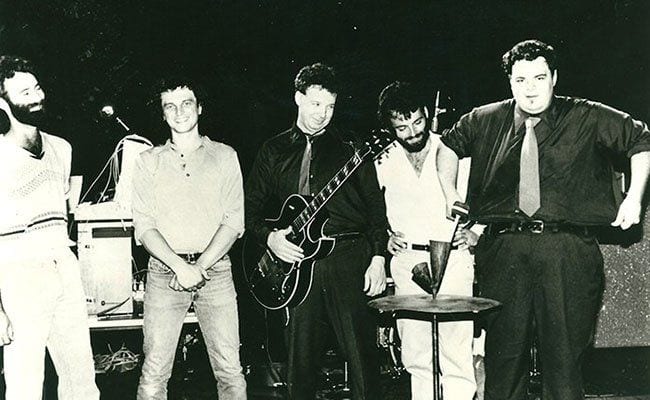
Pere Ubu is an obscure band with a capital ‘O’; a cool band with a capital ‘C’; and a band you discover after years of digging around and digesting all the classics of the rock genre. Simply put, they are art-punk and not well-known, yet these two signifiers combine to create the ultimate name-drop — “But have you heard Pere Ubu’s The Modern Dance?” Their music lives in the same rarified air of other little-known cult groups like the Residents, X-Ray Spex, and Television Personalities. Their story is simple, too: they hailed from the depths of Cleveland in the ’70s. A local group called Rocket From the Tombs split up and became two different groups: the Dead Boys and Pere Ubu. The former is hands down punk, while the latter named itself after an absurd play and made artsy punk/noise. In an attempt to reach new audiences, Fire Records recently reissued the band’s third, fourth, and fifth records (New Picnic Time, The Art of Walking, and The Song of the Bailing Man, respectively).
Their first record, 1978’s The Modern Dance, was an untamable fire. It combined punk and avant-garde in a time when punk was still considered avant-garde on its own. From the opening track, “Non-Alignment Pact”, onward, though, the gist is clear: uncompromising punk with a noise problem led by an uncompromising vocalist just as likely to squeal as he is to sing. Their second record, Dub Housing, is arguably better, but is mostly a victory lap that revisits the same territory as the first record. It’s a one-two punch that’s worth the time of the connoisseur.
In contrast, the next three records, New Picnic Time, The Art of Walking, and Song of the Bailing Man, show a noted change in the direction of the band. Although Dave Thomas opens the first of the bunch by saying, “It’s me again! Hey! Hey! It’s me again!”, it doesn’t take long to notice that the direction of the band has been changed or lost in the haze. For a majority of the rest of record, the driving rhythm of the music seems gone and replaced by an incessant need to sound “weird” or “strange”, and, unfortunately, out of tune. For example, “A Small Dark Cloud” offers nothing outside of a synth mimicking bird chirps for nearly two minutes. Once they have finished with that gimmick, all they offer is a single repeated bass synth note as David Thomas pants, wails, and screams, “Don’t rock the boat” like his life depends on it. Unfortunately, they bring back the bird chirps for good measure occasionally, which wouldn’t be so bad if the song weren’t nearly six minutes in length. This avant-nonsense continues for the rest of the record, with the only small reprieve being offered by the closing track, “Kingdom Come”, which has a bit of a tune.
The Art of Walking, the band’s fourth LP, shows little change from the direction of New Picnic Time . In fact, it seems like their “experiments” were allowed to brew even longer. Whereas New Picnic Time sounded as if the group jammed for a few hours before having David Thomas mumble drunkenly over the recordings, The Art of Walking seems a little more designed, a little more planned. The second track, “Rhapsody in Pink”, offers little outside of Dave Thomas’ abstract warblings and out-of-tune-with-each-other instrument noodlings, but it flexes much more composure than most of the former record could muster. Even though The Art of Walking suffers from the same over-noodling as New Picnic Time, it at least sounds like the band was in the same room together most of the time, and that’s an improvement.
The Song of the Bailing Man is easily the most enjoyable of the three, and the reason is simple: it’s fun. Whereas the last two records were awash with straight-faced weirdness, The Song of the Bailing Man seems to be winking at the audience, acknowledging that music this weird deserves some smiles. The opening track, “The Long Walk Home”, begins as a bizarre jaunt but offers some levity by adding a bridge that sounds like jazz performed by over-exuberant ten-year-olds trying to impress their family. It’s fun. Later, “Use of a Dog” offers melodic sax lines that hilariously blend in with Dave Thomas’ squeaking and squawking vocals, and “West Side Story” closes with positively jubilant guitar explosion. Elsewhere on the record, the antics continue to impress.
These three records heralded an end of an era for Pere Ubu. After Song of The Bailing Man, Pere Ubu went on hiatus for five years, and the next four records (starting with 1988’s The Tenement Year) saw an even bigger change for the band: transformation into an experimental pop group. As strange of a journey as New Picnic Time, The Art of Walking, and The Song of the Bailing Man offered, Pere Ubu was going even weirder places. It’s anachronistic to say, but stay tuned. You shall be entertained.

